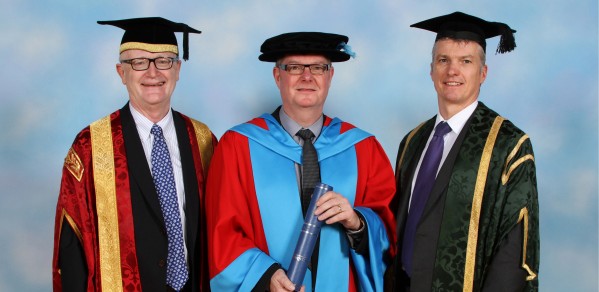
Professor David Cardwell has been awarded an Honorary Doctor of Science (D.Sc) by the University of Warwick.
We talk here, at Warwick, of producing groundbreaking research, of making a global impact and of sustaining a real-world relevance. In Professor Cardwell, we can be proud of an alumnus who has achieved exactly that.
Professor Tim Jones, Pro-Vice Chancellor, University of Warwick
Orator at the graduation ceremony: Professor Tim Jones, Pro-Vice Chancellor.
Mr Vice-Chancellor,
At Warwick, we’re always delighted to welcome back one of our own - especially so, when that person embodies our ethos of making a real-world difference.
We invite to today’s congregation a Warwick alumnus whose work in superconducting engineering is both record-breaking and life-changing. It gives me great pleasure to introduce Professor David Cardwell.
David first came here to study in the 80s. He left Warwick with a Physics degree and a PhD in inelastic gamma-ray scattering; credentials that earned him a place at Plessey Caswell. The research industrial laboratory, which later became part of BAE Systems, gave David an introduction to superconducting materials. David never looked back.
David arrived at the University of Cambridge in 1992 to further his research into superconductors. He is now one of the preeminent figures investigating the immense potential for these materials, which exhibit zero resistance to the flow of electricity at extremely low temperatures. As a result, these materials are also capable of generating large magnetic fields. Their potential impact on the realms of energy, transport, health and more is enormous.
Cambridge is home to the Bulk Superconductivity Research Group, led by David to work on the processing and applications of bulk high temperature superconductors. The group, formed in the year of David’s arrival at Cambridge, has made significant advancements in superconductor activity. These include generating the highest magnetic field ever recorded in a superconductor.
Aside from breaking records, David has played a pivotal role to bringing together global superconductivity experts. He’s a founding member of the European Society of Applied Superconductivity which set up in 1998. He established and led the successful European Forum on bulk superconductivity between 2002 and 2008. He’s presented at over 60 international conferences.
David is an active board member of five international journals, including Superconductor Science and Technology. Beyond journal writing, he is also the author of over 300 technical papers and patents.
David’s career represents a prodigious contribution to the development of superconducting materials for engineering applications. Recognition of his efforts came with his election to the Fellowship of the Royal Academy of Engineering in 2012. As of late last year, he was additionally tasked with leading one of the world’s top ranked engineering departments – David was appointed as the University of Cambridge’s Head of the Department of Engineering.
This is a role that gives David an ideal platform to deliver practical outcomes for society, to engage with real issues and make a true difference…all things that David has notably achieved throughout his admirable career.
We talk here, at Warwick, of producing groundbreaking research, of making a global impact and of sustaining a real-world relevance. In Professor Cardwell, we can be proud of an alumnus who has achieved exactly that.
Mr Vice-Chancellor, in the name of the Senate, I present for admission to the degree of Doctor of Science, honoris causa, Professor David Cardwell.

